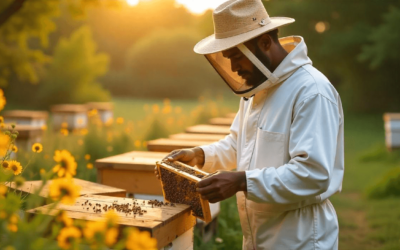Beekeeping is a lucrative and rewarding business in Kenya. The country is known for its vast honey production, and the demand for honey and other bee products is constantly on the rise. However, like any other business, beekeeping has its challenges. Many beekeepers make mistakes that could lead to low honey production, loss of bees, or even the collapse of the business. In this blog, we will discuss eight common beekeeping mistakes and how to avoid them in Kenya.
- Poor Hive Placement
One of the common mistakes beekeepers make is placing hives in unsuitable locations. The hives should be placed in a location with access to sunlight, water, and forage. The hives should be placed in a dry location to prevent moisture build-up, which could lead to the growth of mold or mildew. The hives should also be placed in a location that is away from human traffic to avoid disturbances.
- Improper Hive Maintenance
Hive maintenance is critical in beekeeping. The hives should be regularly inspected for signs of disease, pests, or parasites. The hives should also be cleaned regularly to prevent the build-up of debris, which could lead to the growth of harmful bacteria. Proper maintenance ensures the hives are healthy, and the bees can thrive.
Read: How to maintain bee hives.
- Neglecting to Feed the Bees
Bees need a constant supply of nectar and pollen to survive. During the dry season, when there is little forage available, beekeepers need to feed their bees. Neglecting to feed the bees could lead to starvation, which could cause the bees to die or leave the hive in search of food.
- Inadequate Beekeeping Equipment
Beekeeping equipment is essential for the proper management of a hive. The beekeeper needs to have protective gear, a smoker, hive tools, and a honey extractor. The equipment should be of high quality to ensure the beekeeper is protected and the hive is managed efficiently.
- Failure to Monitor the Hive Population
Beekeepers need to monitor the hive population regularly. A declining hive population could indicate a problem such as disease or pests. The beekeeper should inspect the hive regularly to ensure the hive is healthy, and the population is thriving.
- Using Chemicals Improperly
Chemicals are sometimes used to manage pests and diseases in a hive. However, the chemicals should be used properly and in the right quantities. The beekeeper should follow the instructions on the chemical label carefully to avoid harming the bees or contaminating the honey.
- Harvesting Honey at the Wrong Time
Harvesting honey at the wrong time could lead to low-quality honey or the death of the bees. The beekeeper should wait until the honey is ripe before harvesting. The bees need to have enough honey stored for their survival during the dry season.
- Failure to Educate Themselves
Beekeeping is a dynamic field, and beekeepers need to keep themselves updated on the latest practices and technologies. Beekeepers should attend training programs and workshops to improve their skills and knowledge. This helps to ensure they manage their hives efficiently and maximize their honey production.
Conclusion
Beekeeping is an important business in Kenya, but it requires proper management. Beekeepers need to avoid the above mistakes By avoiding these mistakes, beekeepers can maximize their honey production, ensure their hives are healthy, and improve their profitability.
Are you tired of making common mistakes that can harm your bees and reduce your honey yield? Don’t worry, because we have the solution for you. We offer beekeeping training. Contact us on info@savannahhoney.org.






0 Comments